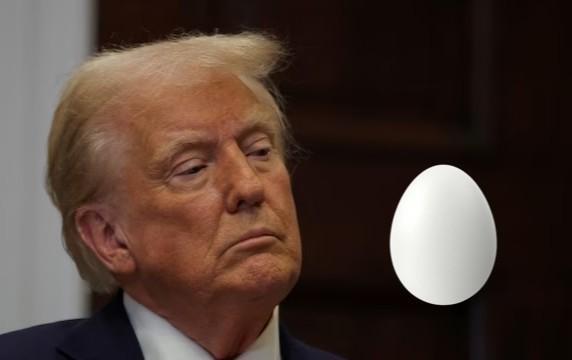
Joe Biden Let the Price of Eggs Get Out of Control: Trump
In his address to Congress last week, President Donald Trump made a bold statement regarding the rising price of eggs in the United States. With egg prices at an all-time high, Trump pointed fingers at his predecessor, Joe Biden, saying, “Joe Biden…let the price of eggs get out of control.” The remark came as a surprise to many, given the current state of the economy and the factors contributing to the increase in egg prices.
The rise in egg prices is largely attributed to bird flu outbreaks, which have led to shortages and a decrease in egg production. According to the United States Department of Agriculture (USDA), the number of egg-laying hens has decreased significantly due to the outbreaks, resulting in a shortage of eggs in the market. This shortage has led to a surge in prices, making eggs one of the most expensive groceries in the country.
Trump’s statement, however, is not without substance. During his 2016 presidential campaign, Trump made the cost of basic goods like groceries a central issue, promising to lower prices and make America’s economy great again. At the time, many Americans were struggling to make ends meet, with the cost of living increasing significantly. Trump’s anti-free trade rhetoric and promises to bring back jobs and manufacturing resonated with many voters, particularly in rural areas where the cost of living is often higher.
Fast forward to 2025, and Trump’s words have come back to haunt him. The rise in egg prices is just one example of the economic challenges facing Americans. Inflation is on the rise, and many are feeling the pinch. According to the Bureau of Labor Statistics, the Consumer Price Index (CPI) has increased by 2.5% over the past year, with food prices rising by 3.1%. Eggs, in particular, have seen a staggering 12.5% increase in prices over the past year.
So, what happened? How did the price of eggs get out of control? The answer lies in the complex interplay of market forces, supply chain disruptions, and government policies. The bird flu outbreaks, while a major contributor to the shortage, are not the sole reason for the increase in prices.
Prior to the outbreaks, the US egg industry was already facing challenges. In 2022, a severe drought in the Midwest led to a shortage of corn and soybeans, two key ingredients in poultry feed. This shortage resulted in higher feed costs, which were passed on to consumers in the form of higher egg prices.
The Trump administration’s trade policies, including tariffs on imports, have also had a significant impact on the egg industry. Many American farmers rely on imports to supplement their domestic production, but the tariffs have made these imports more expensive. This has led to a decline in imports and a shortage of eggs in the market.
Furthermore, the Biden administration’s policies, such as the Renewable Fuel Standard (RFS), have also had unintended consequences on the egg industry. The RFS program requires refiners to blend a certain amount of biofuels into their gasoline, which has led to a surplus of ethanol. This surplus has, in turn, led to a decrease in the demand for corn, which is a key ingredient in poultry feed. The decrease in demand has resulted in lower corn prices, making it more expensive for farmers to produce eggs.
In conclusion, the rise in egg prices is a complex issue with multiple factors contributing to the shortage and price increase. While Trump’s statement may have been a political attack on his predecessor, it is clear that the Biden administration’s policies, combined with market forces and supply chain disruptions, have played a significant role in the current state of the egg industry.
As the economy continues to evolve, it is essential that policymakers consider the impact of their decisions on the cost of living for American families. The rising price of eggs is just one example of the challenges facing Americans, and it is crucial that we work together to find solutions that benefit all.
Source:
https://www.reuters.com/world/us/takeaways-trumps-address-congress-2025-03-05/



